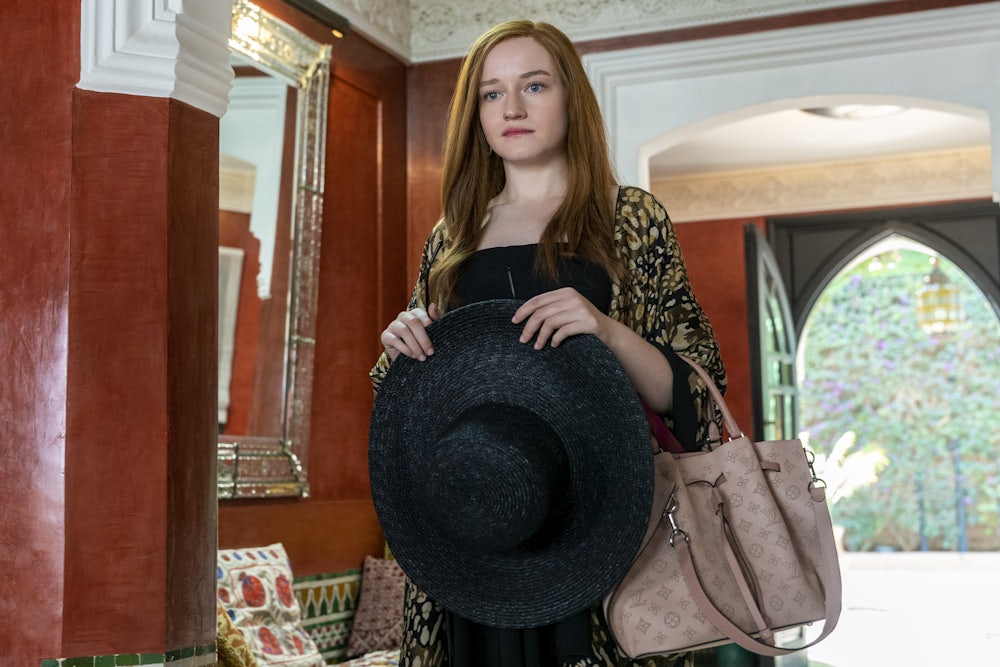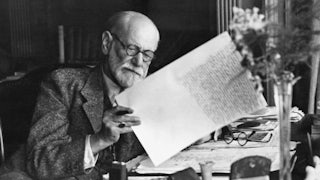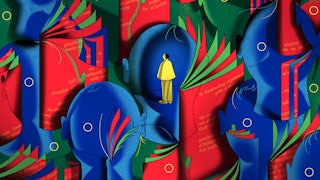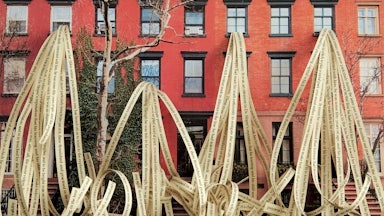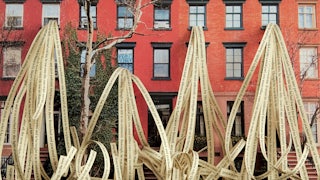When watching a televised, fictionalized adaptation of a real crime story that describes itself as being “completely true, except for the parts that are totally made up,” as Inventing Anna does at the beginning of each episode, there is inevitably a point at which you find yourself having to pause to Google some or other freaky detail of the case. I believed that I was fairly familiar with the Anna Delvey story: her bad checks and skipped hotel bills, her attempted fraud on City National Bank and Fortress, the self-titled art foundation she claimed to be establishing in New York, her untraceable aristo-European accent, her secret Russian heritage, the stylist she employed to make her look appropriately innocent in the courtroom. For me, though, that moment of astonished disbelief came early in the opening installment, in a montage that sees various people who have had contact with Delvey seem to describe three or four entirely different women.
“Her family’s the Delvey family, big in antiques, German,” a former mark suggests. “She’s Russian,” says another, “and her father is a major money guy, something about solar.” “I’ll say this for Anna, she knew how to dress,” a stylist who was briefly friends with her says, fondly. “Always chic Parisian couture.” “Zara off the rack?” says her personal trainer. “For someone with money, I didn’t understand it.” “Her family had some impressionist painting that was supposed to be sold for about 42 mil when Anna turned 25,” a gallerist nods. “It was real—I saw the piece. Or … I think I did.”
Suddenly, surreally, an extremely smarmy finance bro appears and mentions Anna Delvey defecating at his workplace, the startling shift in tone enough to give the viewer whiplash. “She came for a meeting in our office, and she used my bathroom,” he recalls. “I didn’t have any toilet paper, and she did a number two. She came down and spent time in a meeting, and the odor was incredible.” The anecdote is so specific, scatological, and unpleasant that I could not believe it had been invented for the show, which is otherwise exactly as glossily made and easily digestible as is expected for a Netflix series based on an article at The Cut about a kooky pretend heiress. Still, I could find no evidence online that this embarrassing incident ever occurred, and it is the only time Inventing Anna gets this bodily and real. Why, I wondered, would a screenwriter include this if the story did not come from life?
The thought of it continued nagging at me until later, an epiphany struck: References to piss and shit were recently a mainstay in another show about the upper classes, HBO’s Succession, and those references, as Naomi Fry astutely wrote in The New Yorker, suggested that a casual attitude to such taboos might be a way to display power. What could be more convincingly rich behavior than shamelessly forcing every other person in the room to put up—literally or metaphorically—with the “incredible odor” of your shit? Inventing Anna approaches the subject of the superwealthy from a very different angle than Succession or, say, Billions, focusing not on the haves but on a have-not who believes that she has somehow been miscategorized by fate. Nevertheless, it serves to emphasize a similar point: that being a civilian who exists in the same world as networking, tax-avoiding, untouchable millionaires and billionaires means, in effect, being perpetually scammed.
Inventing Anna is one of two dueling series about the con artist known as Anna Delvey, born Anna Sorokin, and its source material is an article by the journalist Jessica Pressler that chronicles Delvey’s reign of terror over New York’s upper classes. (HBO’s take on the case, based on a book written by one of Delvey’s victims, remains in production.) In her piece, Pressler voices some surprise that Delvey, as an individual, is not particularly special. “People kept asking: Why this girl?” she admits. “She wasn’t superhot, they pointed out, or super-charming; she wasn’t even very nice.” In fact, Delvey’s ability to be openly unpleasant to her peers made her seem richer, her imperviousness to judgment and cast-iron confidence unusual for a girl who, as it turned out, had grown up broke in a small town in Germany but not entirely strange for someone born into great privilege. Early in Inventing Anna, a short scene that originally appeared in Pressler’s article very effectively conveys the fascinatingly inhuman, quintessentially Rich Girl way Delvey made friends: hoping to catch the eye of a member of hotel staff who has intrigued her, she stands at the concierge desk robotically sliding $100 bills onto the counter until her intended target has no choice but to abandon their existing client and refocus their attention. Delvey may not have been to the manor born, but her lack of manners helped suggest a person who was at ease with behaving as if those around her could be bought and sold.
Inventing Anna, somewhat misleadingly, opens with a voiceover from Julia Garner’s Delvey, insulting her audience and grandstanding about her “icon” status. “This whole story, the one you’re about to sit on your fat ass and watch like a big lump of nothing, is about me,” she spits, in an accent that blends Russian, German, and a little mid-Atlantic prissiness for good measure. “Anna Delvey’s a masterpiece, bitches!” (Delvey, in the show at least, is consistently fatphobic in a quintessentially 2000s sort of way, a point of view that would have already seemed moderately outdated in 2017, and which seems prehistoric now.) The suggestion is that we are going to see a show about a mean, glamorous, self-aggrandizing scammer, narrated from her perspective and as camp as several Christmases at once. Unfortunately, this suggestion is itself a kind of scam, since the plot turns out to be as much about the competent but ultimately fairly uninteresting journalist proxy who is subbing in for Pressler, a heavily pregnant girlboss by the name of Vivian. Vivian, who works at Manhattan magazine, has “moxie,” her determination to chase down her story at all costs half-fueled by an embarrassing fact-checking incident in her immediate past and half by the fact that she is a lady journalist in a TV show. She has a male superior who represses her, a neglected husband who is sometimes irritated by her passion for her job, and a coterie of plucky aging writer sidekicks at Manhattan who struggle adorably with Instagram, offering viewers the opportunity for a full house on their “fictional female journalist” bingo card.
It is Garner’s Delvey then, and not the earnest, serious Vivian, who makes Inventing Anna worth investing anything in. The Emmy-winning actress has a very different kind of face from the real Delvey, who was once described as looking “like a Sound of Music fraulein.” If from some angles Garner has the same soft, babyish features, she can also rearrange them into something sharper, almost wolfish, if the scene calls for her to look devious or calmly ruthless. Her strange accent, carefully wavering and cartoonishly haughty, calls to mind the one James Franco used to play the equally unplaceable Tommy Wiseau in 2017’s The Disaster Artist, in the sense that any viewer not familiar with the source material might struggle to believe that it was accurate. “Anna’s tongue is kind of flat,” Garner said, discussing her own meetings with the scammer in an interview with Town and Country. “It almost feels heavy and fat. I completely had to change how I moved my tongue … her voice gets less soft-spoken when she wants something.”
Delvey’s former friends described her as appearing to be several different women, and Garner makes that divide literal in her performance, slipping unnervingly between vulnerability and frightening, glassy-eyed sociopathy depending on her audience. Rarely is it an advantage for an actor to keep us entirely closed-off from their character’s inner life, but by the last episode of Inventing Anna, I remained as unsure of her motivations as I had been at the start. Now and then, she provokes sympathy, a kind of tenderness; at other times, especially when Vivian visits her at Rikers, she feels closer to a tiny, redheaded Hannibal Lecter, as if at any moment she might tell the journalist that her cheap shoes make her look like a hustling rube.
Ultimately, Garner’s committed performance adds a layer of complexity to Inventing Anna that might otherwise be absent. The show follows the media narrative of Delvey’s crimes extremely faithfully, and it spends a great deal of its time on Vivian’s home life and career and on the home lives and careers of Delvey’s former friends and victims. The one genuinely intriguing—and presumably invented—aspect of Vivian’s story is her ambivalence toward motherhood, despite being eight months pregnant when she begins covering the case. Parenthood, especially if it is thrust upon a woman more because she feels she ought to be a mother than because she desperately desires to be one, is enough to make even the sanest and most competent of people feel like frauds. (Not for nothing does a character in Sheila Heti’s Motherhood describe the act of becoming a parent as “the biggest scam of all time.”)
The show seems to gesture broadly toward a connection between Vivian and her subject on numerous levels. Vivian occasionally seems to feel maternal about Delvey, who has herself been abandoned by her parents; she may also identify with the petite, oddball scammer on account of neither of them quite conforming to the role they are expected to, even if their rejection of those expectations seems deluded and misguided. When Vivian notes that she is unable to tell if Delvey believes in her own outlandish lies, it is difficult not to think back to an earlier scene in which Vivian, at the ob-gyn and in denial, has to be informed in no uncertain terms that she will be giving birth to her baby very soon, whether she wants to go ahead with it or not.
Obviously, both the story and the baby are eventually released, Vivian’s water breaking as she works right up to deadline in the office at Manhattan, a towel thrown across her chair. That the story seems to thrill her more is, narratively, something of a bold move, giving her another thing in common with her subject: a cool, and thus unfeminine, kind of steeliness, prizing achievement over likability. When she tells a colleague that her article is meant to say “something about class, social mobility, identity under capitalism, I dunno,” it might be a winky comment from the writers of Inventing Anna about the way that the show itself is also about class, social mobility, identity under capitalism, I dunno, while also not being about that much at all other than gossipy entertainment.
Still, there’s the kernel of a nastier and more psychologically rich series in Julia Garner’s dead-eyed stare and Vivian’s panic attacks over her own pregnancy—in the way Vivian lends Delvey her own white dress for the trial, a strange little piece of journalistic tinkering that recalls Joan Didion buying a dress for Linda Kasabian to wear to give her testimony in the Manson case. It is there in the depiction of the former Vanity Fair staffer Rachel DeLoache Williams, whose book My Friend Anna will be the basis of the HBO show and who is made to look by turns naïve and completely craven, dizzied enough by proximity to money that she loses all good sense. Above all else, it is definitely there in the unpleasant finance bro and his anecdote about Anna Delvey’s smell, her carelessness with hygiene in a meeting about money—a reminder that class, social mobility, identity under capitalism, I dunno all ensure that someone somewhere is always being forced to inhale someone else’s stink.
